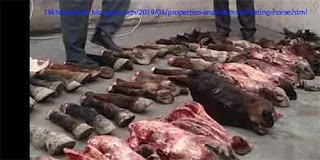Properties and harms of eating horse meat in Islam and Iran are lawful or prohibited and what are its properties
Descriptions of Horse Meat
In many countries, meat and horses are used in sandwiches and other foods, including Italy, 900 g per year, the Netherlands, Belgium, France, Switzerland, whose sales are common in supermarkets and stores. , Germany, per capita only 50 grams annually, Slovenia and Serbia. But the meat is the taboo in many countries and religions. In the religion of Judaism, horse meat is forbidden because the animal is neither a ruminant nor a split poison. Maybe it's interesting for you, but horse meat is forbidden in some Christian denominations. In 732, Pope Gregory III considered horse meat to be a forbidden act of horses, and described it as a dishonorable act. In the year 1000, the Church of Iceland only came to power, promising the Icelanders could continue to eat horse meat, but after the establishment of the church, it was canceled. Horse meat is still popular in Iceland and it is cooked like veal, sheep and pigs. Horse consumption is not common in English speaking countries. In Canada, horse sales are legal but hard to find in the Québec-French-speaking state and some other French restaurants in other areas. Most canned horses are exported to continental Europe and Japan. In the United States, California and Illinois are selling and consuming horse meat. However, during World War II, horse meat was consumed in the United States because beef was expensive and rationed. In the UK, horse-drawn meat can even contain pet food. In the countries of the Balkans, horse meat is not eaten because the horse is considered a nasty animal, and its eating is related to the famine of the time of war, and not otherwise logical. In Islam, the Sunni religions believe that the Prophet on one day departed and forbidden the interim marriage, while the two had been lawful before. But the Shiites do not accept this hadith and they do not consider any of them to be forbidden. Among the shit, eating meat and horse is both abusive and only in certain cases, eating it is permissible, while the disgust of dill is more intense, however, according to a cultural taboo, donkey meat is not consumed in Iran, and in some cases Which restaurants place it as another meat is treated as an illegal act. In this article, the courageous site about the properties and harms of eating horse meat in Islam and Iran is halal, whether it is forbidden or what are its properties. We hope that the case Attention ♥
What is horse meat?
Horse meat is a food product that comes from the horse. In some countries, especially in Central Asia, horse meat is the most commonly consumed meat of people. However, this type of meat is consumed in many other countries, such as continental Europe, South America and Asia. In the eight countries that produce the most horse meat, about four million heads of horses are slaughtered annually. It has a low fat and protein content and is slightly sweet because of its glycogen content
Horse Meat in McDonald's
The report shows that in the McDonald's factory inspection and restaurant restaurants throughout the country, human beings found in 90 percent of centers and horse meat in 65 percent of the centers. FBI Lloyd Harrison said the worst part of the matter was that not only human flesh but also childish meat was seen in these products. Finding different parts of the body in US food factories and thinking that human body fragmentation is really terrible. Creeping things spread thousands of years ago. Of course, there are still a few tribes doing this as their tribal culture, but with these happenings in food stores, we can say that, unfortunately, there is also a male genital mutilation now in the modern world.
Eating prohibited
Taboo foods are said to be foods and beverages that some people refuse to consume on religious, cultural or health grounds. In many cases, this restriction includes certain animal animals including mammals, rodents, reptiles, amphibians, skinned fish, and wildlife. In some cases, the taboo only includes part of the body or the extinctions of the beast, while in other cases, the plants include fungi and insects. Taboo foods are sometimes referred to as codified rules, and in other cases depend on how many animals eat together or how they are slaughtered. The origins of these religious decrees are different, and in some cases, because of health or other reasons, these orders were issued, and in other cases for the symbolic reasons of the prohibition. Some foods may also be banned at certain ceremonies (such as pilgrimage) or at certain stages of life (such as pregnancy) or for certain groups of people (such as clerics).
Horse meat production worldwide
In 2005, the global production of horse meat was over 700,000. Major Horse Breeders in 2005 Country Number of Meat Meat Production Metrics China 1, 700, 000 204, 000 Mexico 626, 788, Kazakhstan 340, 55, 100 Mongolia 310, 000 38, 000 Argentina 255 000 55,600 Italy 213,000 48,000 Brazil 162,000 21,200 Kyrgyzstan 150,000 25,000 Total Global 4,727,898 720,168
Cat meat
The cat is eaten in Chinese, Vietnam, and rural areas with Swiss culture. It is also used in some Peruvian oysters to taste the food. In other parts of the world, people took refuge in catfish during the famine as a siege to Leningrad one of those times. In 2008, a report released that cat is a major part of the food basket in Guangdong, China

Comments
Post a Comment